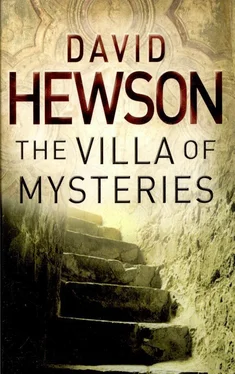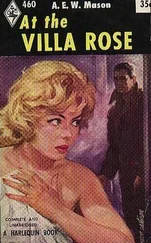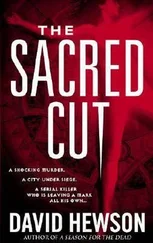“Sometimes it helps. Sometimes it’s the best thing, the kindest thing, you can find.”
Gently, she placed her arms around him, let her damp head fall onto his chest. Nic Costa felt the warmth of her lips brush his neck.
“I don’t want to be alone tonight. Please. Just hold me if that’s what you want. But don’t leave me. Please—”
He pulled himself away, and it was the hardest thing. “I have to go. I’ll call you in the morning. This will work out. I promise.”
There was a hungry, desperate look in her eyes.
“Of course,” she said, and it was impossible for him to read what she was thinking.
It was cold outside, with a little light rain falling gently as a veil in front of the moon. He walked to his car thinking how close he’d been to giving in, whether she was right, and whether it mattered at all.
TERESA LUPO WAS JERKED AWAKE by the bright lights of the crane swinging its burden out of the artificial cavern. The gurney swayed from side to side as if it were teasing her. She yawned and looked at her watch. It was close to midnight. The day seemed endless. Her bruised body hurt like hell. She needed sleep desperately. Yet a man had tried to kill her. This was a new experience. His corpse deserved her attention. For her own sake she needed to peer into his dead eyes searching for some meaning.
Falcone had been on the phone for almost an hour before she nodded off. After the brief factual account she gave of what happened in Randolph Kirk’s office he’d hardly spoken to her. If that was as far as the punishment went, she would be lucky. Teresa Lupo had overstepped the mark several times over and she knew it. But if it helped, if it found Suzi Julius, if it began to unravel the riddle of Eleanor Jamieson’s death, everything would be worthwhile. Perhaps everything would be forgiven.
Rachele D’Amato sat in her own car, talking to no one. The morgue crew, short staffed because they had divided between Kirk’s site and the airport, did their work mutely, knowing something was wrong. Here were three arms of the state, Teresa reflected: the police, the morgue and the DIA. And none of them talking to each other much. Private matters, bruised egos and past relationships had intruded into what should have been a professional, impersonal assignment. She was as much to blame as any of them.
“To hell with it,” she whispered to herself. “If we find out just one more thing about the girl we’re better off than we were.”
Falcone walked over with Peroni. D’Amato got out of the car and joined them. All three looked dog-tired. “We’ve got a body,” the inspector grunted. “I presume you want to see.”
“You bet.” She’d spent hours waiting for them to find a safe way of bringing it to the surface. They’d had to bring in extra machinery, longer cables, teams of men in white hats who disappeared into the ground looking grumpy and puzzled by why they were there. It wasn’t a crime scene. It was a construction site.
Now that the corpse was here, on the ground, strapped to a gurney that shone under the artificial sun of the crane lights, Teresa Lupo didn’t feel as keen to see it face to face as she had earlier. The image of the black-headed insect trying to take away her life was one that would stay with her a long time.
“What do you want from me?” she asked as they walked towards the small team gathered by the trolley, on the side away from the pit.
“Identification would be useful,” Falcone said.
“I can take the helmet off: I can go through his pockets. What about the bike?”
“Checked that already,” Peroni replied. “The number was false but we managed to ID it from the code on the frame. Stolen from Turin three weeks ago. They’ve been losing a lot of high-powered machines from there recently. They think it’s some kind of organized ring.”
“It is,” D’Amato added. “The Turin mob ship them here all the time. We’ve got intelligence. Neri’s involved in that. He’s not the only one. But—”
“Later,” Falcone said.
They stood over the corpse which lay face up on the gurney, limbs awry, pointing at crazy, unnatural angles, like a broken doll. The left arm was almost wrenched from its socket. Bare skin was visible next to bone and torn flesh from the shoulder joint. Teresa Lupo ordered them to turn off the big, bright lights of the crane. They were dazzling her. They had enough illumination of their own with the kit they’d brought along.
“He’s smaller than I remember,” she said. Maybe that always happens, she thought. Normally she just saw dead people. She had no idea what they were like breathing, talking, being alive.
Falcone gazed at his watch and sighed.
“Patience,” she murmured and crouched down, wondering how she felt, whether she could draw up the customary amount of respect for the dead that she tried to bring to every autopsy.
The rider was probably gone the moment he hit the wall of the pit, before his shattered body fell to the bottom of the hole with the bike. His neck was broken, crushed down onto his right shoulder. The helmet had withstood the impact—just. A crazed pattern on the crown marked the impact. The black visor was covered in scratches and mud and dust.
“Poor bastard,” she whispered automatically, and scraped away at the fastening straps. Ordinarily she’d tell Falcone to get lost. Tell him it was too awkward to try to remove the thing here, close to midnight, out in the freezing dead land by Fiumicino. He could wait till they got back to the morgue, with her tools and her easy tricks of the trade. But he didn’t want to wait, and neither did she. The man was dead anyway. It wasn’t going to be a pretty funeral whatever happened.
Teresa Lupo asked one of the morgue assistants to bring over a medical bag, took out a scalpel, carefully cut open the clasps then, as gently as she could, pulled the helmet back towards the top of the head. There was some initial resistance. She adjusted the position of the skull and found an easier path. The plastic moved under the pressure of her fingers, the wrecked corpse nodded forward, and slowly, with great caution, she tugged the fragmented casing free.
Matted yellow hair, coated in blood, fell beneath her fingers.
Peroni turned his back on them, swearing constantly. No one spoke for a minute.
Beneath the bright portable arc lights lay Barbara Martelli, the traffic cop most men in the Questura had, at some stage, fantasized about. Her blonde locks fell in spent and bloodied curls around a face that wore a pained, final sneer. Her dead eyes were half open. Her teeth, normally so bright and white and perfect, betrayed the signs of her cruel death. Behind full, curled lips now turning pale, the gore had risen in her throat, staining them a dark, sticky black.
“For chrissake,” Peroni yelled at no one behind her. “ For chrissake .”
Teresa Lupo reached down and unzipped the jacket, revealing beneath the torn leather the unmistakable female form. Martelli still wore her uniform shirt. A wet, black stain was seeping through her chest, up towards her throat. She remembered the woman well. She looked so unlike any other female cop. Sometimes she’d watch her walk through the station, knowing every male pair of eyes was following her, and a good many female ones too. She’d wonder how it felt to be that attractive, how much maintenance you needed to do on a body that looked as if it just fell out of bed perfect every morning. She’d been jealous. It all seemed so petty now. Teresa Lupo was at a loss to put together any of these pieces. Why Barbara Martelli of all people should be the hitman—sorry, hitperson —deputed to despatch Randolph Kirk to hell. Whether Martelli had decided to extend these deadly privileges to the hapless pathologist locked in the next room on her own initiative, with a little on-the-spot improvisation, or whether she was under orders. And whose? It was as if time were running backwards: with every passing minute they knew less and the world got murkier and more illogical.
Читать дальше












